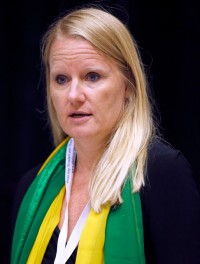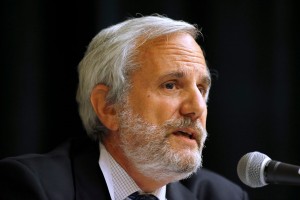How should the United States balance border security and human rights?
Elisa Massimino. Photo by Tony Avelar.
Concerns about national security have driven much of our recent immigration policy—and many of the discussions taking place in the current U.S. presidential election. But how do policymakers balance those concerns with the rights of American citizens and the human rights of people seeking refuge from violence overseas? Two panels at the ABA’s Annual Meeting in San Francisco tackled those difficult topics on Thursday and Saturday.
Thursday’s panel, “U.S. Border Wars: Preventing Terrorism and Protecting Vulnerable Populations,” looked at the border from a counterterrorism perspective. Professor Mohammad Hafez of the Naval Postgraduate School in Monterey, California, opined that “extraordinary measures” at the border have diminishing returns these days. While the Sept. 11 hijackers were foreign nationals here on temporary visas, he said, more recent attacks came largely from U.S. citizens who have been radicalized without strong ties to organized terrorism. Thus, he said, “we need more imaginative policies than our current political discourse is willing to defend.”

Holly Cooper. Photo by Tony Avelar.
William Chip, a tax attorney at Covington & Burling and a board member at the Center for Immigration Studies, agreed that the Sept. 11 model is not the top threat these days, but said immigration policy is still highly relevant. Indeed, he said, one reason it’s not the main threat is that border security has improved significantly. And there are still vulnerabilities, he said. One of these is the treatment of minors who arrive at our borders unaccompanied by adults. They’re often released—and while the government is supposed to screen the families that take them, it sometimes falls short, he said. However, he noted that there’s no evidence that any of them are involved in terrorism.
Thursday’s talk also included a discussion of balancing American citizens’ right to privacy with law enforcement’s needs. Judge James P. Jones of the U.S. District Court for the Western District of Virginia is also a judge on the Foreign Intelligence Surveillance Court, which hears the government’s requests for surveillance of American citizens. He explained the process and noted that although the court proceedings are secret, they don’t grant every application the government wants.
Cindy Cohn, executive director of the Electronic Frontier Foundation, is a watcher and sometime critic of the FISA court. Her “big thesis,” she said, is that the court’s task is inappropriate for a secret court. After former NSA contractor Edward Snowden revealed the existence of surveillance programs, she said, Congress made some changes, including the establishment of amici to FISA court.
Border security took a different role in the discussion at Saturday’s talk, “Refugee Crises: Challenges in Europe and at the U.S. Border,” sponsored by the Section on Civil Rights and Social Justice. That program focused on treatment of people fleeing violence and requesting asylum. In the United States, most have come from the “northern triangle” of Central American countries—Honduras, El Salvador and Guatemala—where gang violence is so rampant and uncontrolled that people are willing to literally walk from Central America to the U.S. border despite the difficulties and dangers they know they’ll face.
In Europe, attention has focused on refugees from the Syrian war, but refugees also come from Afghanistan, Iraq, Eritrea, Tunisia, Morocco and other countries. Panelists agreed that neither the U.S. nor the European Union has a system that’s working well. In the United States, said Holly Cooper, associate director of the Immigration Law Clinic at the University of California at Davis School of Law, refugees are routinely detained, although a Southern California federal court ordered an end to detention of minors in 2015. In Europe, refugees end up in camps on Greek islands, waiting for screenings on admissibility. In both cases, the remoteness of the place where they wait—and disinterest from local authorities—have contributed to the refugees’ problems securing counsel.

T. Alexander Aleinikoff. Photo by Tony Avelar.
Elisa Massimino, President and CEO of Human Rights First, added that while there are certainly crises, she believes they are crises of leadership. Massimino believes the United States should take more Syrian refugees, not only because they desperately need homes, but because it would permit our country to lead the world on counterterrorism. Taking more Muslims puts the lie to Islamic State’s propaganda that the West is hostile to Islam, she said, and promotes stability in the Middle East.
Professor T. Alexander Aleinikoff of Columbia Law School and the Migration Policy Institute added that international law actually privileged refugees as compared to some other immigrants—but nation-states have typically not lived up to their obligations under those international agreements. He joked that he considered bringing a pocket-size copy of such an agreement and asking whether either presidential candidate has read it, a reference to recent U.S. political events.
This is a global crisis that “can’t be solved by any one country,” Massimino said. “But there is one country with the resources, standing and leadership to put forth such a plan, and that country is ours.”
Follow along with our full coverage of the 2016 ABA Annual Meeting.




